The Regency Era in England, spanning from 1811 to 1820, was a time of elegance, refinement, and social change. While often associated with the lavish lifestyles of the wealthy elite, it is crucial to also acknowledge the significant presence and contributions of Black individuals during this period. Despite facing systemic racism and discrimination, Regency Era Black people played a vital role in society, shaping cultural practices, political movements, and artistic endeavors. In this article, we will delve into the lives and experiences of Black individuals during the Regency Era, shedding light on their resilience, creativity, and lasting impact on British history.
Step Into the World of Cheryl Bolen
Dive into the enchanting stories of love, intrigue, and elegance set in the Regency Era. Cheryl Bolen's novels offer timeless romance and captivating tales that will leave you wanting more.
Explore Cheryl Bolen's Books Now
Challenges Faced by Black People in Regency Era Society
In the Regency Era, black people faced numerous challenges within society. One major obstacle was the prevalence of slavery, which subjected many black individuals to regency era life expectancy”>harsh living conditions and forced labor. This dehumanizing institution stripped them of their basic rights and freedoms, perpetuating a cycle of oppression and inequality.
Moreover, black people in Regency Era society often encountered systemic discrimination and prejudice, making it difficult for them to access education, employment, and social opportunities. Many were marginalized and excluded from mainstream society, facing limited prospects for advancement and success. The pervasive racism of the time further perpetuated negative stereotypes and reinforced harmful biases against black individuals.
Despite these challenges, black people in the Regency Era showed resilience, strength, and determination in the face of adversity. They formed tight-knit communities, supported each other through difficult times, and fought for their rights and dignity. Through their perseverance and courage, black individuals in Regency Era society paved the way for progress and social change, leaving a lasting impact on history.
Significance of Black Communities in Regency England
In Regency England, the presence of black communities played a significant role in shaping society during this time period. Despite facing discrimination and prejudice, black individuals made valuable contributions to various aspects of life in England, including the arts, literature, and politics.
Black communities in Regency England were often marginalized and faced societal challenges, but they also found ways to thrive and carve out spaces for themselves. Many black individuals were able to build successful businesses, establish social networks, and even gain positions of influence within certain circles.
Through their resilience and determination, black communities in Regency England challenged traditional notions of race and class, paving the way for greater diversity and inclusivity in society. Their stories and experiences deserve to be recognized and celebrated for the role they played in shaping the cultural landscape of the time.
Notable Figures: Influential Black Individuals of the Regency Era
Maria Edgeworth
Maria Edgeworth was an influential black writer during the Regency Era. She was known for her novels that explored themes such as race, class, and gender. Her most famous work, “Belinda,” was a groundbreaking novel that challenged societal norms and pushed for greater equality.
Robert Wedderburn
Robert Wedderburn was a prominent black political activist who fought for the rights of enslaved people during the Regency Era. He was a vocal critic of the slave trade and spoke out against the injustices faced by black individuals. Wedderburn’s speeches and writings were instrumental in the fight for abolition and equality.
Mary Prince
Mary Prince was a black abolitionist and autobiographer who advocated for the rights of enslaved people in the Caribbean during the Regency Era. Her autobiography, “The History of Mary Prince,” shed light on the brutalities of slavery and helped to galvanize support for the abolitionist movement. Prince’s powerful storytelling and activism made her a key figure in the fight against slavery.
Recommendations for Further Study and Understanding of the Regency Era Black Experience
Exploring the Regency Era Black experience is a rich and important area of study that sheds light on the often overlooked narratives of Black individuals during this time. To further deepen your understanding of this fascinating period in history, consider delving into the following recommendations:
Firstly, delve into the memoirs and writings of prominent Black figures of the Regency Era. Individuals like Olaudah Equiano, Mary Prince, and Ignatius Sancho offer valuable firsthand accounts of life as a Black person during this time. Their writings provide insight into the challenges, triumphs, and complexities of being Black in a society marked by slavery and inequality.
Secondly, explore the cultural and artistic expressions of Black communities during the Regency Era. From music and literature to visual arts and fashion, Black creatives made significant contributions to the cultural landscape of the time. Studying the works of artists like Joseph Emidy and writers like Phillis Wheatley can offer a deeper appreciation of the diversity and richness of Black experiences during this period.
Wrapping Up
the experiences of black individuals during the Regency Era were marked by both challenges and resilience. Despite facing systemic racism and discrimination, many black individuals were able to carve out successful lives for themselves and make significant contributions to society. It is important to acknowledge and celebrate the diverse narratives of black people during this pivotal period in history, as their stories continue to shape our understanding of the past and inform our present-day perspectives. As we continue to explore and learn about the Regency Era, let us remember the invaluable contributions of black individuals and ensure that their voices are heard and honored.


